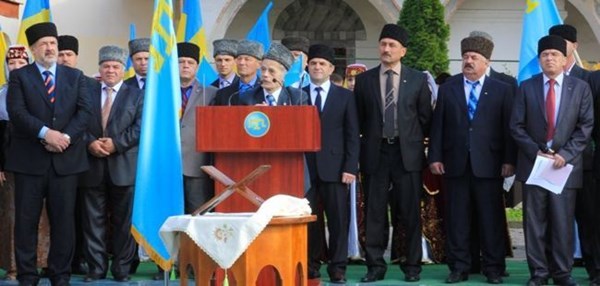Advocacy group calls on international organizations to protest against ban of Crimean Tatar Mejlis
A Crimean advocacy group has appealed to international organizations with a statement of non-acceptance of the ban on the Mejlis of the Crimean Tatar People in Crimea. In their statement, the advocates called on international organizations to influence the situation in order to prevent politically motivated prosecutions of Crimean Tatars and the Mejlis of the Crimean Tatar People.
This document is a response to the lawsuit brought by the Russian Prosecutor General of the Republic of Crimea, Natalia Poklonskaya, in which she asks to recognize the Mejlis of the Crimean Tatar People as an extremist organization and ban its activity within the Russian Federation.
"The application of Russian anti-extremist laws against the Mejlis of the Crimean Tatar People may result in criminal prosecution against the members of the Mejlis of the Crimean Tatar People and other representatives of Crimean Tatar People,"the statement says. Advocates noted that the leaders of the Mejlis do not recognize the annexation of Crimea and are advocating for the territorial integrity of Ukraine.
"In this regard, there are reasons to believe that the actions of the Russian Prosecutor General of the Republic of Crimea are a continuation of the systematic reprisals against the residents of Crimea who don’t support the occupation of the peninsula. The unreasonable restriction or ban on the activities of the Mejlis of the Crimean Tatar People violates the rights of indigenous people, among which the right to self-government and the right to preserve its own customs and traditional institutions. These actions are a threat to the preservation of the identity and development of the Crimean Tatar People," the Crimean advocacy group stressed.
The statement was sent to the Deputy Head of the United Nations Human Rights Monitoring Mission in Ukraine, Fiona Frazer, the EU Ambassador to Ukraine, Jan Tombiński, the Council of Europe Commissioner for Human Rights, Nils Muižnieks, and the Head of the Council of Europe Office in Ukraine, Vladimir Ristovski. The Russian Prosecutor General of Crimea, Natalia Poklonskaya, appealed to the court with the request to ban the Mejlis of the Crimean Tatar People and recognize it as an extremist organization.
Afterwards, the representative body of the Crimean Tatars stated that the suit has a lot of legal inconsistencies and believes that the emergence of this lawsuit is politically motivated and they are prepared to fight the ban. The European Union has already expressed concern about Russia’s intentions to ban the activity of the Mejlis of the Crimean Tatar People.
After the annexation of Crimea by Russia in early 2014, the Russian authorities had banned the leaders of Crimean Tatars, Refat Chubarov and Mustafa Dzhemilev, from entering the Crimean peninsula for five years. The Verkhovna Rada of Ukraine officially announced on the 20th of February 2014 that the temporary occupation of Crimea and Sevastopol by Russia had begun. On the 7th of October, 2015, the President of Ukraine, Petro Poroshenko, signed the corresponding law.
International organizations have recognized the occupation and annexation of Crimea as illegal and have condemned Russian actions. Western countries imposed a number of economic sanctions against Russia in response to the occupation. Russia denies the occupation of the Crimean peninsula and calls it the restoration of historical justice.
